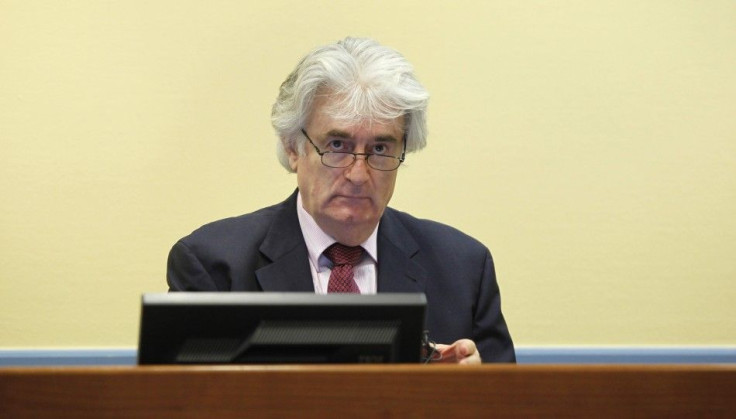On Trial For War Crimes, Bosnian Serb Leader Karadzic Wants To Be ‘Rewarded’

Taking the stand in his own defense at an international tribunal at the Hague on Tuesday, notorious war criminal Radovan Karadzic assured the court that a Muslim barber had recently cut his hair.
Karadzic was attempting to convince his audience that he does not discriminate against Bosnian Muslims -- despite the fact that he had played a leading role in military initiatives that killed thousands of them only two decades ago.
The defendant, now 67, was once a prominent leader of the Christian Serbs during the Bosnian War, a multidimensional conflict that followed the fractious dissolution of Yugoslavia during the early 1990s. The war had a death toll of up to 200,000 and displaced millions more.
“Everybody who knows me knows I am not an autocrat, I am not aggressive, I am not intolerant,” said Karadzic on Tuesday, according to the New York Times. His voice was steady; his demeanor was calm.
“On the contrary, I am a mild man, a tolerant man with great capacity to understand others.”
That barber did an admirable job. Before his arrest, Karadzic had a cloud of white hair growing past his shoulders, not to mention a full beard and mustache. Before that, he was clean-shaven but easily identifiable by the voluminous shock of silver hair that seemed to sprout from his scalp in all directions.
Today, the eccentric former warlord wears sensible spectacles and dark suits as he addresses the court. His hair is now completely white, parted haphazardly down the middle and hanging down to his ears.
These drastic changes in appearance are not surprising when you consider the varied life Karadzic has led and the bloody war crimes whose reckoning he may still be trying to escape from.
Karadzic was once a mild-mannered psychiatrist and poet who dabbled in financial and medical fraud. But he changed remarkably upon entering politics during his mid-40s, just as sectarian tensions were beginning to tear at the patchwork republic of Yugoslavia.
He became a strident ultranationalist leader, calling for a territory that would belong exclusively to Christian Serbs. That goal required the expulsion or extermination of tens of thousands of Muslims and Croats.
During the ethnic, territorial and religious war that engulfed former Yugoslavia during the early 1990s, Karadzic worked closely with equally reviled military general Ratko Mladic to advance the cause of Christian Serbs.
Karadzic was a key leader of the 1992-1995 siege on Sarajevo that killed more than 12,000 people. He was also involved in the massacre at Srebrenica, which killed at least 8,000 Bosnian Muslims in 1995.
But despite their abundant weaponry and frequent atrocities, Mladic, Karadzic and their forces were never able to quash their opposition. The Serbian movement lost steam after a few years as Croats and Muslim Serbs allied against it, and the war officially ended with help from a NATO intervention in 1995.
Shortly thereafter, Karadzic went into hiding. He grew his long white beard, adopted a pseudonym and turned to a career in naturopathy. He was finally found and arrested in Belgrade in 2008.
Now, as a charge of the International Tribunal for the Former Yugoslavia, Karadzic faces 10 charges of crimes against humanity and genocide. If convicted, he will serve life in prison.
Tuesday marked the beginning of the final trial of a long tribunal focusing on the atrocities committed during the Bosnian war. The tribunal has indicted several alleged war criminals on all sides of the bloody Bosnian conflict, including Muslims, Croats and Albanians. Mladic’s own trial began this year.
Karadzic, who took it upon himself to mount his own defense and is independently conducting the examination of witnesses, shocked observers on Tuesday with his cool defiance of the charges. His statements of innocence are as just consistent as they ever were.
“Instead of being accused, I should have been rewarded for all the good things I have done,” he said, according to Reuters. “I did everything in human power to avoid the war. I succeeded in reducing the suffering of all civilians."
© Copyright IBTimes 2024. All rights reserved.












